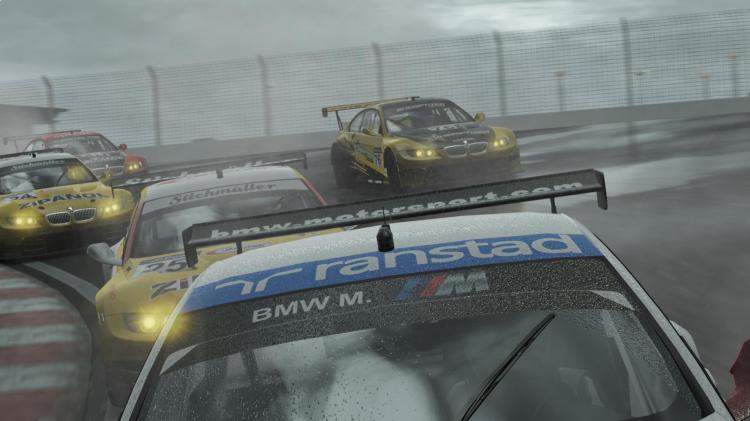An email box rapidly fills with messages from your Project Cars pit crew, your teammates, and other teams, while a Twitter-like feed displays messages from your fans reacting to your races. The messages you get change depending on your performance and what happened during the last race. It’s a little hokey, but it’s amusing and more personal than you might expect.
What you won’t like
Time to create that Pandora driving playlist
I finally found an area where realism in driving games isn’t all it’s cracked up to be: sound effects. Sure, each car sounds different, but the engine noises are so grating, so insistent, and so loud in comparison to the voice on your pit radio or the squeal of your tires, that it took about 20 minutes for me to start tamping down the sound altogether.
It’s not even that realistic; in these circuits, you’d be wearing a noise-dampening helmet, not sitting with your ear a half-inch from the engine. The throaty revving rumble of a high-end tourer loses its charm when it’s blasting in your hear at high RPMs for hours — or in the case of the 24 hours of Le Mans, a continuous day if you don’t choose to speed up time in game — of driving.
The musical tracks for menus and car views are also loud, and almost hilariously dramatic — think pompous Wagnerian opera and choirs — but I liked them. They said, with nary a wink, that a really good driving game should be considered as Very Serious art.
This is a sim, and it will never let you forget it
Project Cars is a twitchy bitch to drive sometimes. A touch at the wrong moment and you’ll be in the grass, and at higher difficulty levels, that’s the end of the race. If you drive well, you’ll be rewarded; if you don’t, you’ll feel the penalty, both in how fast you go and in the penalties you receive for contact or leaving the track.
Don’t expect the game to hold your hand: Those arrows that change color to warn you that you’re hitting a corner too fast weren’t accurate for most of the race categories, leaving me to figure my own way around tracks I’d never seen before. That’s all right, but if you’re hoping for a happy arcade experience along the lines of GRID or Forza Horizon, this is not the title for you.
The end result is a challenging game for the hardcore sim racer, but truthfully, most of the time you’re going to be fighting yourself, not the other cars on the track.
Speaking of those cars
Wonky A.I. issues have plagued Project Cars from the beginning, mostly relating to problems with how computer-controlled cars react to your driving moves, and a few are still around in this final build. In low difficulty levels, computer-driven cars stick to the ideal line around turns as if they were on rails but compensate by being ridiculously slow.
At high levels, they also follow a perfect path, but those virtual drivers have their feet on the gas. Still, they’ll go to great lengths to avoid you. It’s a smart move, given how much car-to-car contact is a negative in this game, but it feels a little weird when you see it play out on track.
The end result for my normal-difficulty run was feeling like Project Cars’ true challenge wasn’t to beat the other racers I was up against, but to hone my own skills to beat myself, treating the opposition like obstacles that dotted the raceway. It was an odd experience, though not unpleasant, and if the sim aspect of the game is what draws you, I don’t think it will interfere with your enjoyment in the slightest.
Conclusion
I was pleasantly surprised by Project Cars in its final form, given its rocky progress. It’s a fine sim and a truly beautiful racer, with enough depth to keep fanatics engrossed for a long time. Bandai Namco promises more cars over time, which I hope translate into more racing experiences, the way each car does in the starter pack.
The A.I. is probably the game’s major weakness, but the driving experience is strong enough that you may not need a high-end challenge from other computer-controlled cars. Hopefully, the online experience — up to 16 players on consoles and 32 on PC — should make that concern moot, but I was unable to test online play for this review.
Score: 85/100
Bandai Namco will release Project Cars on May 7 for PlayStation 4, Xbox One, and PC. The publisher gave GamesBeat a PC download code for this review.
VentureBeat's mission is to be a digital town square for technical decision-makers to gain knowledge about transformative enterprise technology and transact. Learn More





